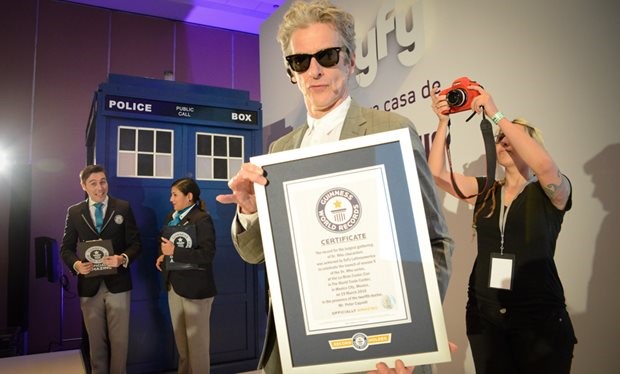
It's hard to imagine there was ever a time when bowties weren't cool, Doctors didn't regenerate, and pockets weren't inexplicably full of jelly babies. Since the shows inception, Doctor Who, quickly became a household staple before growing into the cultural phenomenon it is today.
Doctor Who is centered around the Doctor, a rogue Time Lord from the planet Gallifrey in the Constellation of Kasterborous. The Doctor fled Gallifrey in a stolen Mark I Type 40 TARDIS (Time And Relative Dimension In Space), which allows him to travel through time and space. The TARDIS features a chameleon circuit to change the appearance of the machine and disguise it as everyday objects.
However, the Doctor’s TARDIS remains fixed as a blue British police box, due to a malfunction within the circuit. Or so he says, given that he still drives with the breaks on, it could very easily be his fault. Typically, the Doctor is accompanied by at least one companion on his adventures. Although he can travel through time, the Doctor strives to avoid changing any fixed points in history. More often than not, the Doctor goes up against evil forces to save innocent people. Especially those located on Earth as the Doctor holds a special place in his hearts for humans.
In addition to his trusted companions, the Doctor is rarely ever without his sonic screwdriver. This versatile tool has saved the Doctor's behind on more than one occasion. As a Time Lord, he possesses the ability to regenerate when his body is mortally damaged. Not only does this regeneration process change his physical appearance, but his personality is affected as well.
Given that while regenerating his brain cells are shaken up, it’s no wonder his behavior becomes very erratic immediately afterword. Although each incarnation of the Doctor has his own quirks, his core attributes of heroism and intolerance of injustice are universal.
Over the years, the Doctor has acquired numerous reoccurring enemies. The most popular of which being the Daleks, the Cybermen, and the Master – who happens to be another renegade Time Lord. As this was a science fiction television show, controversy sprung up over whether the show was suitable for young children. The phrase “hiding behind the sofa” entered British pop culture as a direct reference to the television show. A research study conducted by BBC in 1972 found Doctor Who to be the most violent drama program produced at that time. The sensationalism of those findings only increased viewership.
Sydney Newman, along with Donald Wilson, C.E. Webber, Anthony Coburn, David Whitaker, and Verity Lambert, are the small team responsible for initially bringing the series to life. Originally, the program was intended to be a family show, geared toward teaching children about history through the use of time travel. The very first episode of Doctor Who, “An Unearthly Child,” premiered on Saturday, November 23, 1963.
William Hartnell portrayed the first incarnation of the Doctor, although at the time the idea of regeneration hadn't even been conceived. Although Hartnell played the Doctor from 1963 to 1966, his deteriorating health combined with his increasingly bad attitude, made it apparent he could no longer play the Doctor.
At the time, Doctor Who had incredible numbers and they couldn't afford to cancel the show. Thus, the idea of regeneration was born! Over the years the explanation as far as how or why the Doctor regenerates has changed several times. Initially, it was linked to the technology within the Doctor's TARDIS.
Now, Whovians understand the process to be a biological ability exhibited by the Time Lords at the time of their death. In the episode, “The Deadly Assassin,” it was revealed that Time Lords can only regenerate 12 times. However, given that the Doctor is currently the last of the Time Lords it is unlikely that his thirteenth incarnation will be his last. Right?
Doctor Who originally ran for 26 season between 1963 and 1989, during which time the Doctor was portrayed by Hartnell, Patrick Troughton (1966-1969), Jon Pertwee (1970-1974), Tom Baker (1974-1981), Peter Davison (1982-1984), Colin Baker (1984-1986), and Sylvester McCoy (1987-1989). Unfortunately, falling viewing numbers and a decline in the public perception saw production suspended in 1989.
Although in-house production had ended, BBC was hoping to find an independent company to relaunch the show. Enter Philip Segal, a British expatriate who worked for Columbia Pictures in the U.S. In 1996, following long negotiations, Doctor Who returned to television in a made-for-TV movie broadcast on FOX with Paul McGann at the helm.
Despite the impressive reception in the U.K. (9.1 million viewers), it was less successful in the U.S. and was not picked up for a new series. During this time, Doctor Who continued on in the form of audio plays and various novels. Thankfully in 2003, Whovians received a godsend in the form of writer Russell T. Davies. Davies and Julie Gardner served as executive producers with BBC for the reboot of the series.
On March 26, 2005, Doctor Who finally returned to television with Christopher Eccleston taking up the mantle of the Doctor. Since the reboot, their have since been nine further seasons, as well as Christmas Day specials every year since 2005. Following Eccleston the Doctor was portrayed by David Tennant, Matt Smith, and currently Peter Capaldi.
As of 1963, there have been 826 Doctor Who installments on TV, ranging from 25- to 45-minute episodes, two feature films, 11 Christmas specials, 4 additional specials, mini-episodes, and as of 2012 a 50th anniversary special. During the 1960s to the late 1980s, the series was adapted into several stage productions including Doctor Who – The Ultimate Adventure and The Curse of the Daleks.
The rebooted series success led to a 13-part spinoff series entitled Torchwood, an anagram of Doctor Who. Torchwood was so popular that it was picked up for three additional seasons. Another inspired and incredibly successful spinoff was The Sarah Jane Adventures, which aired from 2007 to 2010. Back in October of 2015, BBC announced plans for yet another spinoff series to Doctor Who, entitled Class.
Steven Moffat eventually replaced Davies as head writer and executive producer of the series. Moffat is known within the Whovian community as the angel of death, basically if you see his name appear before an episode get ready to cry. Moffat's latest reason for causing pain came in the announcement that he is stepping down following the 2017 finale.
Before you go getting yourself worked up, remember the 2016 Christmas special just aired and the newest season premieres in 2017. That gives Moffat plenty of time to empty your tear ducts and rip out your heart, hurray!
Doctor Who has been recognized on countless occasions for being one of Britain’s finest television programs of all time. Over the years, the series has been nominated for over 200 awards and has won over a hundred of them. They include a Writers' Guild of Great Britain award for Best Writing in a Children's Serial, the Auntie Award for Best Popular Drama, a British Academy Television Award for Best Drama Series, five consecutive awards at the National Television Awards, five BAFTA TV Awards, 25 overall wins at the BAFTA Cymru Awards, and a People's Choice Award for Favorite Sci-Fi Show.
The program additionally holds several Guinness World Records including longest-running science fiction show in the world, most successful science fiction series of all time, largest ever simulcasts of a TV drama for their 50th anniversary special, and largest gathering of people dressed as Doctor Who characters. To put it simply, Doctor Who is without question one of the greatest things to happen to TV and pop culture.
Director extraordinaire Steven Spielberg summed it up beautifully when he said “the world would be a poorer place without Doctor Who.” Indeed, it would.
























